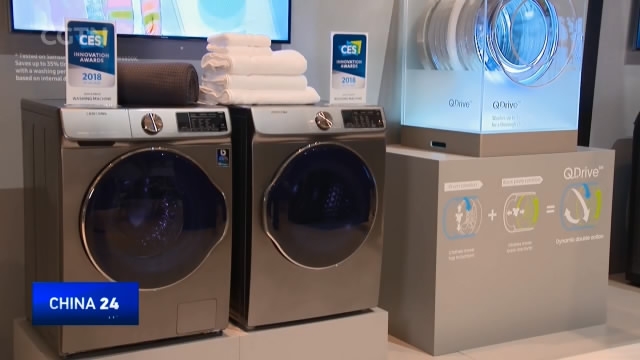
20:41, 29-Jan-2018
China-US Trade Ties: White House plans to make trade enforcement a top focus

President Trump is set to make his first State of the Union speech on Tuesday, with many expecting him to touch on two key issues - healthcare and the economy. But others will be looking for signals too, with China concerned about the growing sentiment of protectionism. CGTN's White House Correspondent, Jessica Stone reports.
Since last spring, the Trump administration has launched a series of investigations -- into alleged unfair trade practices in SOLAR; STEEL; ALUMINUM -- AND INTELLECTUAL PROPERTY. Each one -- names China as a possible cause of injury to U.S. competitors. In announcing additional tariffs on solar imports Tuesday, U.S. President Donald Trump cast himself as the protector-in-chief.
DONALD TRUMP US PRESIDENT "My administration is committed to defending American companies, and they've been very badly hurt from harmful import surges."
Former U.S. trade official, Stephen Kho expects Trump will announce more trade penalties directed at Beijing-ahead of his State of the Union Address on January 30th.
STEPHEN KHO ATTORNEY, AKIN GUMP STRAUSS HAUER & FELD LLP "It's the best place for Trump to be able to announce everything and look like he's being strong on trade and against China."
China economist, Yukon Huang says some of Trump's complaints are more about sending that message than about targeting the true reasons why U.S. domestic production has suffered. Take trade penalties on steel imports for example.
YUKON HUANG, SENIOR FELLOW CARNEGIE ENDOWMENT FOR INTERNATIONAL PEACE "In an economic sense it's almost trivial."
Jessica: "Why?"
YUKON HUANG, SENIOR FELLOW CARNEGIE ENDOWMENT FOR INTERNATIONAL PEACE "Because China only accounts for 1, 2, 3% at most of American steel imports, the bulk comes from Canada, Europe and other countries."
But sending that message comes at a cost. In the case of this week's solar and washer tariffs, China promised to "resolutely defend its interests". The Republic of Korea pledged to file a complaint to the World Trade Organization. Europeans expressed fears that U.S. protectionism would hurt them too.
In the generation since Trump's key trade advisors were last in government, the global supply chain has tightened linking the fates of Asian manufacturers to U.S. workers, companies, and consumers. That means penalties on imports could mean layoffs at home, and higher bills for American families.
STEPHEN KHO ATTORNEY, AKIN GUMP STRAUSS HAUER & FELD LLP "I think to act in the way of 30 years ago may not be quite as useful in today's environment."
YUKON HUANG, SENIOR FELLOW CARNEGIE ENDOWMENT FOR INTERNATIONAL PEACE "The question is-can this get out of hand? If you levy penalties that are seen as significant, then from a Beijing perspective, they need to retaliate in some way."
JESSICA STONE WASHINGTON So far, American and Chinese officials are publicly committed to avoiding a trade war, but tensions could escalate. Jessica Stone, CGTN, Washington.

SITEMAP
Copyright © 2018 CGTN. Beijing ICP prepared NO.16065310-3
Copyright © 2018 CGTN. Beijing ICP prepared NO.16065310-3